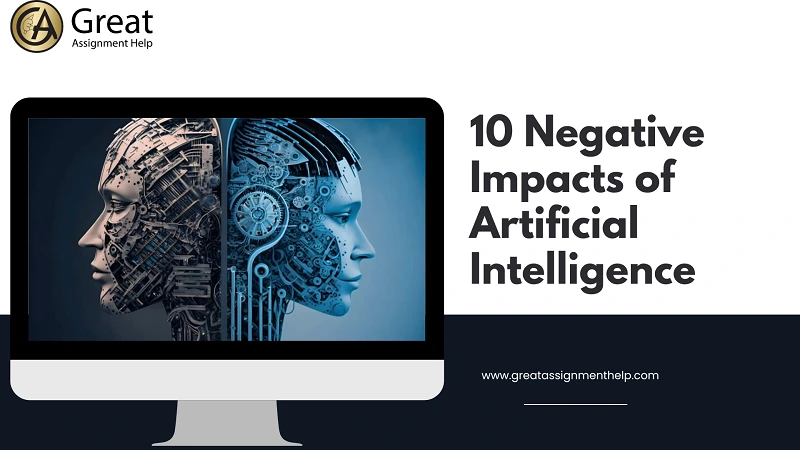The negative impacts of artificial intelligence are a growing concern. It can take over jobs and cause unemployment. Also, AI can make biased decisions and invade people’s privacy. These issues can compromise security and fairness. To benefit society, we need to address these risks and ensure AI is developed and used responsibly every step of the way.
Every coin has two sides. Similarly, everything that is invented in this world has both advantages and disadvantages. The same applies to Artificial Intelligence (AI), one of the trending technologies in recent times. Especially in our modern world, AI has been providing several benefits in a variety of smarter ways, but still, it has also been causing some negative consequences. Would you like to know what the negative impacts of artificial intelligence are? If yes, then continue reading this blog post. Here, we have analyzed and listed some major risks of artificial intelligence.
Before we move on to the disadvantages of artificial intelligence, first, let us see a brief overview of artificial intelligence and its advantages.
What is Artificial Intelligence?
Artificial Intelligence is an advanced technology for developing machines that replicate human intelligence. Computational systems, data, and algorithms are the three components that play a vital role in the creation of AI-based machines or devices.
AI machines are designed to behave and make decisions similar to humans. Additionally, these machines will also observe, evaluate, and learn from data and errors like the way a human brain does.
In recent times, artificial intelligence is increasingly present in daily life in the form of self-driving automobiles and smart assistants like Alexa, Siri, and so on. Most importantly, the features of AI technology have been causing an impact on organizations, resulting in advancements in the medical, hospitality, retail, manufacturing, and finance sectors.
Benefits of Artificial Intelligence

In simple terms, artificial intelligence is a customized program that is capable of thinking and learning. Anything can be considered artificial intelligence if it consists of a program that executes a task that we normally expect a human to complete.
In general, AI is capable of creating both positive and negative influences. Specifically, AI plays a positive role in improving efficiency through task automation, analyzing data for informed decisions, helping with medical diagnosis, and bringing advancements in autonomous vehicles. Here, let us have a look at some advantages of using AI technology.
- Reduces Human Error
- Achieves Accuracy and Precision
- Zero Risks
- 24/7 Availability
- Saves Time
- Improves Productivity
- Provides Digital Assistance
- Performs Repetitive Tasks
- Solves Real-world Problems
- Enhances Productivity
- Makes Quick Decisions
- Excels in Pattern Identification
- Supports New Inventions
- Analyzes Deeper Data
- Gives Personalized Experiences
Also Read: What Is AGI Artificial Intelligence?
Negative Impacts of Artificial Intelligence
Till now, we have seen the pros of AI. Next, let us go ahead and explore the negative impacts of artificial intelligence.
Find here some major drawbacks of artificial intelligence.
1. Biased Decision
AI algorithms are being created by humans. Therefore, those algorithms might have a built-in bias. If algorithms are developed with bias, then the data in the training sets will also be biased, which in turn might produce biased results. This reality may cause unintended consequences. To come up with unbiased decisions, companies need to build unbiased AI algorithms and responsibly train the system with valid sets of data.
2. Unemployment
Most of the AI-based machines are designed to do jobs performed by humans. Therefore, AI-driven automation can lead to a reduction of job opportunities in a variety of industries. Particularly, low-skilled individuals might be affected because of the latest advancements that exist in the world due to artificial intelligence. Since AI technologies have been evolving and becoming more efficient, the workforce must build new skills to stay relevant in the field.
3. Lack of Transparency
One of the serious negative impacts of artificial intelligence is the lack of transparency. Generally, even for techies who deal closely with artificial intelligence technology, understanding AI and deep learning models will be more challenging. Therefore, the fundamental logic and decision-making procedures of these technologies will be hidden by their opaqueness. Also, people may become distrustful of AI systems and reject their adoption if they are unable to understand how they arrive at their conclusions.
4. No Ethics
A machine can behave like a human, but it can’t be ethical. Morality and ethics are significant aspects of human nature that are challenging to replicate in AI-based devices. Many people fear that the rapid advancements of AI will someday become uncontrollable and wipe out humanity.
5. Loss of Creativity
Another big drawback of AI is that it will not allow people to think out of the box. Typically, AI can learn over time using pre-fed facts and past experiences, but overall, its approach will not be creative enough. For example, based on the facts and data provided, a bot can create an article or report on its own, but it will lack the personal touch usually present in other materials created by humans.
6. Privacy Issues
Usually, AI systems collect large volumes of personal data and analyze it. But there is no guarantee for data safety. Sometimes, using AI-based machines or devices can also lead to several data privacy and security issues. Therefore, to prevent such risks, it is essential to adhere to strict data protection rules and implement secure data management practices.
Also Read: Reasons Why Artificial Intelligence is Important
7. Emotionless and Loss of Human Connection
We have been taught in our childhood that neither computers nor other machines have emotions and feelings. Since humans work in teams, managing teams is essential to achieve goals or objectives. However, there is no doubt that robots outperform people when used properly. Also, indeed, human relationships that constitute the foundation of teams will not be replaced by computers.
Moreover, increased reliance on AI-driven communication and interactions may result in less empathy, social skills, and human relationships. Therefore, it is necessary to maintain a balance between technology and human connection to retain the core of social character.
8. Causes Economic Inequality
As discussed earlier, because of AI-driven automation, low-skilled workers may lose their jobs. This, in turn, may increase the wage gap, decrease the opportunities for social mobility, and lead to economic inequality.
The concentration of ownership and development of AI among a few major firms and governments may increase this inequality because of their money accumulation and power, while smaller enterprises struggle to compete. Especially, to address economic inequality, policies and initiatives that promote economic equity, such as re-skilling programs, social safety nets, and inclusive AI development, will have to provide a more balanced distribution of chances.
9. Security Risks
As AI systems become more advanced, the security concerns associated with their usage and the potential for misuse also grow. Moreover, hackers may also use AI to build more advanced cyber-attacks, get around security measures, and exploit system vulnerabilities. Therefore, to reduce these security concerns, governments and organizations must create best practices or build international standards and rules to fight against AI security threats.
10. No Improvements
Artificial intelligence cannot be built by humans since it is a technology based on pre-loaded data and experience. Also, AI can repeat the same work, but if we wish to make changes, we must manually alter the programs. Furthermore, AI cannot be accessed and used in the same way that the human brain does, but it can store a large amount of data.
Machines can execute tasks only based on how they were programmed. So, if they are expected to do nothing, then they will typically fail or provide meaningless outputs, leading to serious consequences. As a result, it is impossible to produce anything normal.
Also Read: Latest Artificial Intelligence Topics to Consider for Research
Conclusion
We hope you have gained a better understanding of the advantages and negative impacts of artificial intelligence. It is an essential duty of humans to ensure that the rise of AI does not go out of control. Although artificial intelligence has both pros and cons, its influence on the global market is apparent. AI grows every day and enables businesses to be more sustainable. This indicates the importance of AI literacy, and skilling is necessary to succeed in several new-age jobs. If you want to learn more about AI, then contact us immediately. We have well-qualified academic writers to offer personalized artificial intelligence assignment help online. Especially with our professional support, you can enhance your knowledge of the advanced technology concepts and handle your assignments effectively as per your university guidelines.



